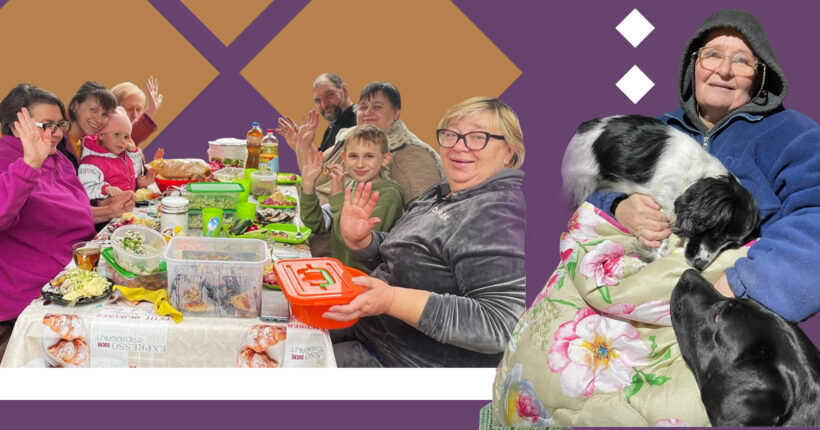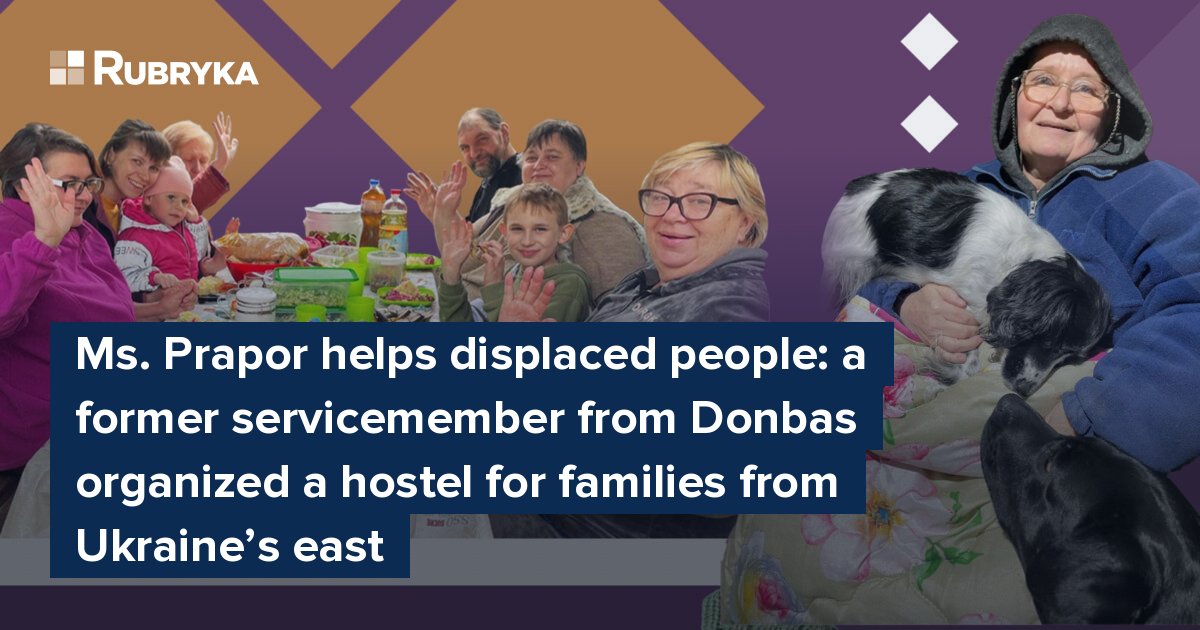
At home among strangers: departure from Donbas in 2014

Ms. Prapor took this nickname because of her position as a service dog trainer and a border guard ensign, or praporshchyk in Ukrainian. Photo: Baeva's Facebook page
Ms. Prapor took this nickname because of her position as a service dog trainer and a border guard ensign, or praporshchyk in Ukrainian. For more than seventeen years, Baeva served Ukraine in the State Border Service ranks in the Donetsk-Avia border control department and at the Ilovaisk railway checkpoint.

Baeva and her three adopted children had to leave her hometown in May 2014. Baeva's Facebook page
"Whenever I started a shift, my superiors ordered me and my co-workers to guard the border of Ukraine. For some people, it was just words – judging by the number of my co-workers who quickly changed epaulets," says Baeva, of those who defected to Russia.

Baeva at service, training the dog. Photo: Baeva's Facebook page
War – both conventional and in the information sphere – is ruthless to everyone. Long before Russia invaded Donbas, Baeva faced pro-Russian sentiments in her immediate environment — from her neighbors, close friends, and those closest to her — her own husband, with whom she adopted three children.
Unlike his fully pro-Ukrainian wife, he supported the occupation and waited for the arrival of the Russian authorities. The children also suffered from this, which Ms. Prapor could not allow. That's why, when battles broke out in Donbas in May 2014, she and her children left their native Yasynuvata and went to one of her friends in Belarus.
 Baeva's children. Photo: Baeva's Facebook page
Baeva's children. Photo: Baeva's Facebook page
"When I woke up, I saw a Ukrainian flag at some small station in the car window, and I quietly happily roared so as not to wake up and scare the children. It was a relief after the three-color Russian flags spread all over the house and a St. George's ribbon, a symbol of Russian military glory, on the chest of the most seemingly close person, who used to lash out at the children when they watched cartoons in Ukrainian. I stood between them with a pan in my hands," Baeva says, recalling simpler times before all-out war.
"Already in December 2021, we had prepared a shelter in the basement"
After two weeks of waiting, the conflict dragged on, and Baeva decided to return to Ukraine together with her children. She had the opportunity to stay in Belarus, but desired to return to Ukraine.
"For those who don't understand: I am a patriot of Ukraine, or ukropivka, as my friends in Donbas call me. I was born in Ukraine; I grew up there. I studied in Ukraine. I fell in love with, and was disappointed in Ukraine. I gave birth to children and buried my son in Ukraine. I also had many children in a not quite traditional way — also in Ukraine. I saved children from war. In Ukraine," Baeva says proudly of her motherland.

"I was born in Ukraine; I grew up there. I studied in Ukraine. I fell in love with, and was disappointed in Ukraine," Baeva says about her patriotism. Photo: Baeva's Facebook page
Baeva chose the Poltava region because she already had life experience in the border region. There was also an understanding that Russia's war would not end with the occupation of Donbas and Crimea alone. There, for the first time, she was helped by one of her numerous acquaintances, who first rented an apartment for her, and later helped with the search and design of a house.
Money was collected for this house, as Baeva says, from all over the world. Baeva's friends and ordinary citizens who showed interest in her story provided assistance, for which she is still grateful.
When the family moved into the house with nothing but a three-legged chair, neighbors and friends came and brought a bunch of things — a bucket of beets and onions, a live duck, a jar of honey, two pillows, a refrigerator, a folding table, chairs, a washing machine.
"I used to run to the post office as if I was going to work," recalls Ms. Prapor. "Books for my son, a slow cooker, backpacks, stationery, forks and spoons, fabric, and curtains — people sent all different kinds of things."
The family worked on their new nest for eight years. Improvements began with a simple water supply and wall insulation. Soon, the place became a large farm with a vegetable garden, a berry orchard, and a bunch of pets and domestic animals. Ms. Prapor even prepared for the coming war in advance.

Baeva's family was ready for war already in 2021. Photo: Baeva's Facebook page
"Already in December 2021, we had prepared a shelter in the basement. Gas lamps and burners, a box of candles and solid fuel tablets, dry soups, cereals, oil and butter, coffee, teas, sugar, a supply of water, toilet paper, pills, dressing material, dishes, and warm things," Baeva recalls.
What is the problem?
Ukraine after February 24
After the beginning of the full-scale invasion, many people have found themselves in the same position as the Baeva family did back in 2014. Many of them lost their homes due to shelling and were forced to leave due to danger and fear for the lives of their relatives.
According to the Ministry of Social Policy, as of the end of 2022, more than 4 million people are registered as internally displaced persons in Ukraine, of which more than a million are children. According to Svitlana Startseva, deputy director of the Department of Housing Policy and Improvement of the Ministry of Community and Territorial Development, preliminary estimates counted 116,000 residential buildings destroyed or damaged in Ukraine, where about 3.5 million people lived.
Not everyone could rent a home because many people lost their jobs along with their homes, and real estate prices rose significantly. Humanitarian hubs did not always have enough space for everyone, as difficult times required the care of every citizen.
Rukavychka — "Debts must be paid"
After what Baeva experienced in 2014, she says she could not stay away from the grief of her fellow citizens, because like no one else, she has lived with dire conditions and knows how important support can be in difficult times.

Baeva at the bomb shelter holding a dog. Photo: Baeva's Facebook page
"Debts must be paid. This is an axiom. If in 2014 we had the opportunity to spend the whole summer with our virtual friend Anna in Belarus, then this time it was my turn to extend a helping hand to those who needed it."
During the full-scale invasion, Ms. Prapor's house was a refuge for many people and animals. Someone left her house after spending some time there, and someone stays to this day. Baeva named her dormitory Rukavychka, or a mitten.
Oksana Ivanets, a virtual friend of Ms. Prapor, became the first guest of Rukavychka. She came with her husband, four children, two cats, and a labrador named Benya. That's how an eight-year online friendship became a real one.
Baeva accommodated the family in a guest house. About a week later, the Ivanets family left for Poland. Ms. Prapor sent her younger daughters, Anna and Valeriia, with them for their safety. Despite the girls' objections, the mother's military background made her decision unshakable. Today, they live in safetyin Germany.
Baeva's virtual friends from Germany arranged everything: they bought bus tickets for her daughters to Duisburg and rented accommodation in Lviv for a few days. Then they met them in their city and provided them with clothes and shoes. They have become their like their mothers and have temporarily performed family duties. The family of the eldest daughter, Hanna, with two granddaughters, Sashunaya and Sava, went from Kyiv to the Ivano-Frankivsk region, and after, they also moved to Duisburg.
On February 25, the family of Iryna Oleksandrova's friend arrived at Rukavychka. They had known Ms. Prapor for more than twenty years since they lived in Donbas. She left Sloviansk with her five-year-old grandson and her husband. The family was placed in the room of Baeva's son Viktor, who back in 2021 joined the Armed Forces of Ukraine. According to Oleksandrova, they plan to return home after Ukraine's victory, and therefore they have been living under the wing of Ms. Prapor for more than a year.
"We have been living next to a wonderful woman for a year. There are no words to express my gratitude to Ms. Prapor. Every time she impressed me with her actions — she helped my son's unit with donations, helped my husband with treatment because he has cancer," Oleksandrova says about her life in Rukavychka.

Baeva could not stay away and felt the need to help fellow Ukrainians in tough times. Photo: Baeva's Facebook page
After the departure of Ivanets, a family from Kharkiv moved into the guest house. Oksana Plotnikova is also an acquaintance of Ms. Prapor from the virtual world. She has a big family — husband, wife, eleven-year-old son, eight dogs, and five cats. Now in Baeva's yard, you can't tell which animals are local and which are temporary guests. She cheerfully answers the question of how many animals live on the premises: "Who counted them?".
Plotnikova and her family have also been living in Rukavychka for almost a year now without planning to go anywhere else or return home. She found out about Ms. Prapor a long time ago from social networks, and for many years she followed stories from her life. Under such circumstances, although not the best, she is now a part of this story.
"Life is raging in the dormitory! Something interesting happens every day. There are many stories — about the cucumber harvest, or how the refugee, Labrador Benya, ate tomatoes," Oksana shares.
Currently, the Rukavychka hostel is still open and accepting guests. As Ms. Prapor herself says, she still has a free sofa in the passage room, so she will be able to accommodate a couple more people and gladly do so.
Newsletter
Digest of the most interesting news: just about the main thing









